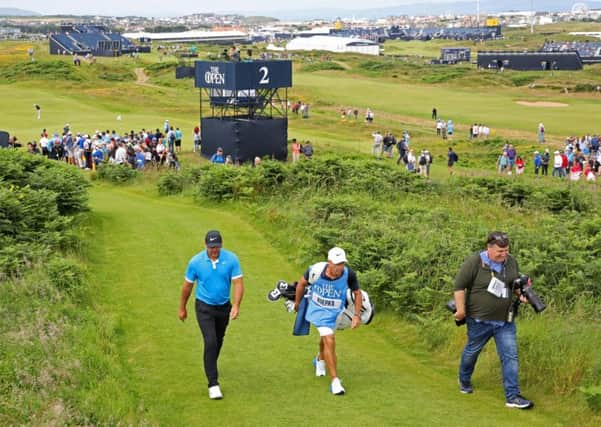Brooks Koepka raves about caddie Ricky Elliott but still has a chip on his shoulder


Koepka’s record in majors this season is written in binary code: 2-1-2. Indeed he is aiming for a fifth major victory in ten starts. Since in his view the Open champion will come from the same tiny cohort capable of winning, you might say he fancies his chances this week. “If the conditions are the exact same for everybody, yeah, the number doesn’t change,” he said.
Though he had never been to Northern Ireland before his arrival here last Friday Koepka’s already keen prospects are buttressed by the man on his bag, Rickie Elliott, a Portrush native who as a junior was both Ulster Boys and Ulster Youth champion. “Every hole I just step up on, [I say] you tell me what to do, you’ve played it more than anybody. So just let him figure it out. He knows his spots to miss it. The spots to come in from, with different hole locations and different winds.”
Advertisement
Hide AdAdvertisement
Hide AdKoepka’s affection for Elliott is obvious and genuine. For the most part Koepka’s public pronouncements are delivered by a man charm forgot. When speaking about Elliott the mask cracks a little. The pair have been together since 2013. Apart from his knowledge of the game as a talented amateur, Elliott, far right, brings an intuitive understanding of the psyche to the piece.
Sensing what to say and when is just as important than pulling the right club in this environment.
“He keeps it light,” Koepka, left, said. “He knows not to talk about golf while we’re out there. He knows if I’m getting a little bit tense, maybe upset, angry, whatever it is, he can tell just by my walk. He can tell, just body language. I think that’s what makes a great caddie. A lot of times he’ll tell me to slow down, slow my walk. If I get angry, my walk just gets a little bit quicker. And then under pressure he knows exactly what to say at the right time, and that’s what you want in a caddie. I wouldn’t want anybody else on my bag, I know that. He’s been tremendous. He’s part of the reason why I’ve had the success I’ve had. And I love the guy to death.”
Koepka offers an intervention at Shinnecock Hills during the US Open last year as an example of Elliott’s influence on outcomes. “I think we were seven over after maybe 25 holes or something like that. And he turned to me and he just said, ‘You’re not far out of it. I know it looks that way, but you’re not far out of it, so get it going.’ I kind of laughed at him and for the first time he really got serious with me and was like, ‘No, get it going. You’re not far out of it.’ That kind of propelled me to have a good back nine and kind of put myself within striking distance on the weekend and then was lucky enough to win it.”
Koepka built time in for a little R&R before returning to the yardage book, enjoying a tour of Elliott’s youth along the Antrim coast. He should do more of this.
It makes him appear almost two dimensional. “We took a little drive around on Friday afternoon, and then went into town. It’s fun to go down there. We went down to the Harbour Bar, just kind of had some food. It was nice to see everything he’s talked about for so long. We went and visited his parents, saw where he grew up. It’s neat for him. It’s neat for me to see because I feel like I’ve heard so much about this place.”
And then the shutters lowered again. Asked about the discrepancy in results between standard PGA Tour events [two wins] and majors Koepka was effortlessly dismissive. “I just practice before the majors. Regular tournaments I don’t practice. If you’ve seen me on TV, that’s when I play golf.”
Back to where we started. Back to that canyon on the shoulder. Being the outsider suits him. He feeds on affronts. It gives him energy and purpose. He claims not be that bothered about the media’s love of others who have achieved less. Koepka is convincing in most things, but not this. “Like I said, over the last year and a half, I just felt like if other guys had done what I had done it would be a bigger deal. Now it doesn’t matter to me. I’ve got my own chip on my shoulder for what I’m trying to accomplish.
Advertisement
Hide AdAdvertisement
Hide Ad“I’ve got my own goals I want to set, and that’s where I find my chip. How many majors I want to win, how many wins, my own accomplishments. I’m over that. I’m over trying to get the recognition. You either like me or you don’t, that’s life in general.”